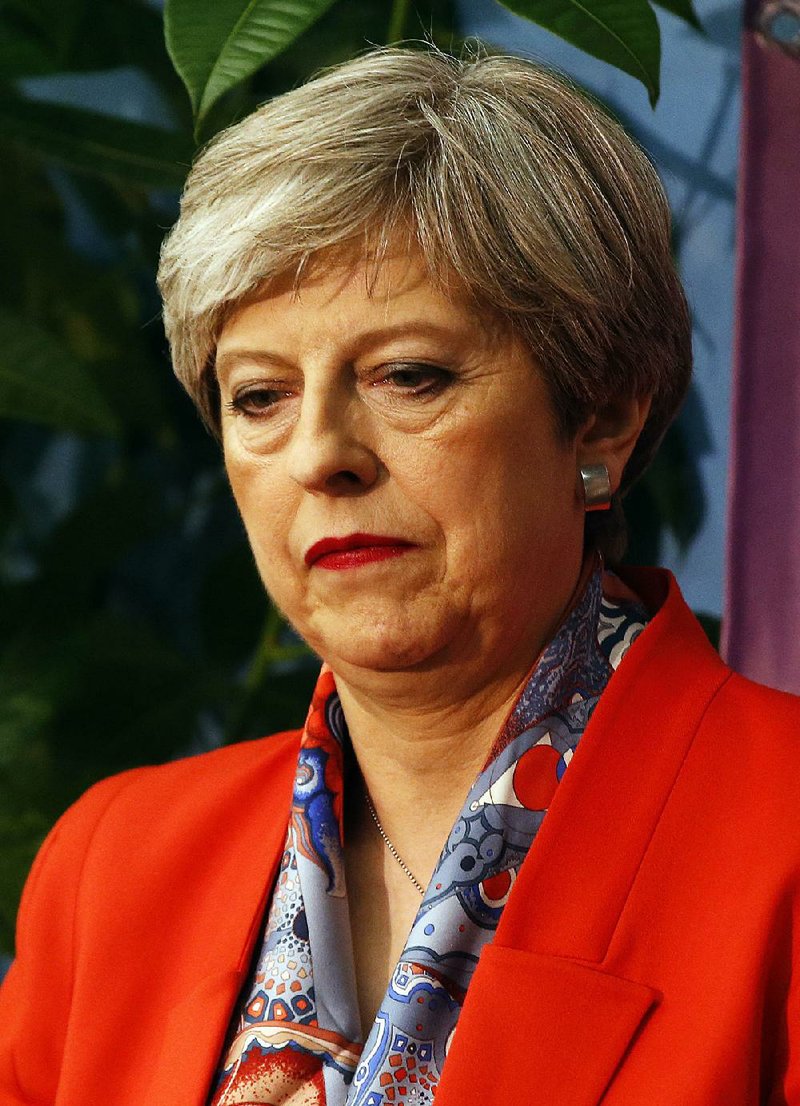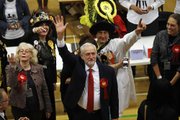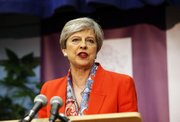LONDON -- Exit polls showed British Prime Minister Theresa May's majority hold on Parliament was up in the air, putting her in a tight race with the Labor Party and its leader, Jeremy Corbyn.
May called a snap election in the hope of increasing her majority and strengthening the United Kingdom's hand in exit talks with the European Union. But the final weeks of the campaign, marred by deadly attacks in Manchester and London, found a surging Labor Party seeking a setback for May.
With only 25 of 650 seats yet to declare, the results appeared to be generally bearing out an exit poll that predicted the Conservatives would get 314 seats in Parliament, down from 330, while the Labor Party was projected to win 266, up from 229.
The Scottish National Party was predicted to lose 20 of its 54 seats, while the centrist Liberal Democrats were projected to win 14 seats.
Conducted for a consortium of U.K. broadcasters by interviewing voters leaving polling stations, it is regarded as a directional, but not exact, indicator of the result.
Early today, British media reported that Conservatives could no longer win an outright majority in Parliament.
Sky News reported that the Labor Party held the seat of Southampton Test, guaranteeing that no party will reach the 326 seats necessary for an overall majority in the 650-seat Parliament.
"Whatever the final result, we have already changed the face of British politics," Corbyn said.
As she was resoundingly re-elected to her Maidenhead seat in southern England, May looked tense and did not spell out what she planned to do.
"The country needs a period of stability, and whatever the results are, the Conservative Party will ensure we fulfill our duty in ensuring that stability so that we can all, as one country, go forward together," she said.
Others predicted she would soon be gone.
"If the poll is anything like accurate, this is completely catastrophic for the Conservatives and for Theresa May," former Conservative Treasury chief George Osborne told ITV. "Clearly if she's got a worse result than two years ago and is almost unable to form a government, then she, I doubt, will survive in the long term as Conservative Party leader."
Ed Balls, a former Labor Party Treasury chief, said it would hurt May's negotiating position with Europe.
"I don't see how she can be a strong and credible figure now to lead these negotiations," he said.
Corbyn said the result means "politics has changed" and voters have rejected Conservative austerity. Speaking after being re-elected to his London seat, Corbyn said May should "go ... and make way for a government that is truly representative of all the people of this country."
During the previous election, in 2015, the Conservatives did better than the exit poll predicted, and senior Conservatives said they would take a wait-and-see approach.
"It's still very, very early in the evening," Northern Ireland Secretary James Brokenshire said. "It's too early in the night to be drawing conclusions."
The forecast is much better than expected for the opposition Labor Party, which had been expected to lose seats.
Labor Party economy spokesman John McDonnell, one of Corbyn's main deputies, urged caution.
"I'm a natural pessimist, and we'll see whether I'm an optimist in the morning," he said.
The result was bad news for the Scottish National Party, which by early today had lost about 20 of its 54 seats.
A big loss could complicate the Scottish Nationalists' plans to push for a new referendum on Scottish independence as the U.K. prepares to leave the EU.
"Indy Ref 2 is dead in Scotland," said Scottish Conservative leader Ruth Davidson, using a short form for a second independence referendum.
Terror anxiety
May called the election seven weeks ago -- three years ahead of schedule and with her party was well ahead in the polls. She argued that increasing the Conservative majority in Parliament would strengthen the U.K.'s hand in EU-exit talks.
While she was personally against Britain's exit from the EU, the June 2016 vote in favor caused David Cameron to resign, and she emerged as prime minister.
But the EU exit failed to emerge as a major issue in the campaign, as both the Conservatives and the Labor Party said they would respect voters' wishes and go through with the break-up.
Then attacks that killed 30 people in Manchester and London twice brought the campaign to a halt, sent a wave of anxiety through the U.K. and forced May to defend the government's record on fighting terrorism.
Eight people were killed near London Bridge on Saturday when three men drove a van into pedestrians and then stabbed revelers in an area filled with bars and restaurants. Two weeks earlier, a suicide bomber killed 22 people as they were leaving a concert in Manchester. Before May called the election, five people died during a vehicle and knife attack near Parliament on March 22.
Rachel Sheard, who cast her vote near the site of the London Bridge attack, said the election hadn't gone as expected -- and that it certainly wasn't about the British exit.
"I don't think that's in the hearts and minds of Londoners at the minute, [not] nearly as much as security is," said Sheard, 22. "It was very scary on Saturday."
After the attacks in Manchester and London, May said this week that she would consider rewriting human-rights legislation if it gets in the way of tackling extremism.
Corbyn, meanwhile, accused Conservatives of undermining the U.K.'s security by cutting the number of police on the streets.
Maria Balas, 28, a waitress, said security was the prime issue. "England is under attack and at this time we need a strong leader more than ever," Balas said after casting her vote for the governing Conservative Party. "I don't like Theresa May, and I wouldn't have bothered to vote if this election was all about giving her more power to take us into the mess of Brexit, but now we are dealing with a security crisis, and I think she is the most qualified person in the running who can deal with that."
While security was on many voters' minds, it was far from the only issue.
"It's important, but it's only one issue amongst several," said 68-year-old Mike Peacroft. "I wouldn't necessarily say it's at the top. Obviously at my end of the [age] spectrum I'm more interested in things like pensions and so forth, [National Health Service] health care -- plus schooling, those are really my main concerns."
In London's eastern borough of Hackney, young people seemed more concerned about future job prospects.
"The Tories only care about the rich and their interests," said Luke Wright, 26, who earns about $9.70 an hour working at a stationery shop.
"I have computer skills that could get me a much higher-paying job, but they are given to people who could afford university fees and living costs," he said. "If Labor won I'd have a chance to make more cash and get out of this job that I'm overqualified for."
May, who went into the election with a reputation for quiet competence, was criticized for a lackluster campaigning style and for a plan to force elderly people to pay more for their care, a proposal her opponents dubbed the "dementia tax."
Corbyn has drawn thousands of people to upbeat rallies and energized young voters with his plans to boost spending on health and education after years of Conservative austerity.
Corbyn told supporters at his final rally that the Labor Party's campaign had "changed the debate and given people hope. Hope that it doesn't have to be like this; that inequality can be tackled; that austerity can be ended; that you can stand up to the elites and the cynics. This is the new center ground."
Information for this article was contributed by Jill Lawless and Gregory Katz of The Associated Press; and by Steven Erlanger and Stephen Castle of The New York Times.
A Section on 06/09/2017


